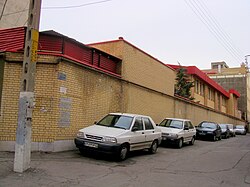Dimashqiyya or Damashqiyya (Persian: دمشقیه) is an old historical neighborhood of Tabriz. It is also referred to by local Azerbaijanis as Gumushqaya (South Azerbaijani: گوموشقیه, romanized: Gümüşqaya) who claim that the former is Persianized variant.[1] It is currently a part of District 8 of Tabriz. It is bounded by Mehraneh river to the north and east. To its west is Beheshti street and to the south is Qarabaghi alley.
Dimashqiyya
| |
|---|---|
Old Neighborhood | |
 Al-Zahra High School in Gumushqaya, where former cemetery of Dimashqiyya located | |
| Coordinates: 38°04′25.29″N 46°18′51.37″E / 38.0736917°N 46.3142694°E | |
| City | Tabriz |
| Country | Iran |
| Founded by | Baghdad Khatun |
| Named for | Demasq Kaja |
History
editIt was formed around Dimashqiyya madrasah which was founded by Baghdad Khatun[2] to honor his executed brother Demasq Kaja.[3] Madrasah's calligraphy was made by ʿAbdallāh Ṣayrafī who also worked on Mosque of Master and Student.[4] The madrasah was next to the cemetery where several Chobanid and Jalayirid rulers were buried:
- Hasan Kuchak
- Malek Ashraf
- Demasq Kaja
- Shaikh Hasan Jalayir
- Shaikh Hussain Jalayir
- Ahmad Jalayir (as well as his mother)
- Tandu Khatun
- Shah Walad Jalayir (d. 1411)
- Ala ad-Dawla Jalayir
The cemetery was destroyed in 1970s under Pahlavi regime and Al-Zahra High School for Girls was built on its place in 1978.
References
edit- ^ "İran azərbaycanlıları: "Türkcə olan qədim adlar farslaşdırılır"" [Iranian Azerbaijanis: "Old Turkish names are Persianized"]. BBC News Azərbaycanca (in Azerbaijani). Retrieved 2024-01-19.
- ^ Blair, Sheila S. (2008). "Calligraphy in Iran and its Environs under the Mongols and Turkomans". Islamic Calligraphy. Edinburgh University Press. doi:10.3366/j.ctvxcrjn5.13. ISBN 978-0-7486-3540-5.
- ^ ʿUmrānī, Bihrūz; Sangarī, Ḥusain Ismaʿīlī (2007). Baft-i tārīḫī-i šahr-i Tabrīz [Historical context of Tabriz city] (in Persian). Tihrān: Mīrāṯ. pp. 133–134. ISBN 978-964-8955-05-7.
- ^ Soucek, Priscilla P. (2020-08-20), "ʿABDALLĀH ṢAYRAFĪ", Encyclopaedia Iranica Online, Brill, retrieved 2024-01-19
